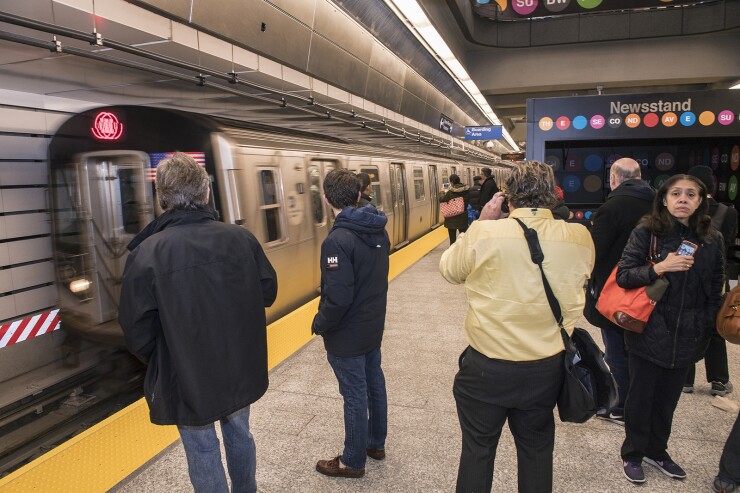Want unlimited access to top ideas and insights?
New York’s Metropolitan Transportation Authority received its second downgrade in five months from S&P Global Ratings, which cited weaker debt-service coverage.
S&P lowered its issuer credit rating to A from A-plus while also downgrading its long-term rating and underlying rating to A from A-plus on the MTA's outstanding transportation revenue bonds. The outlook is negative.

The rating actions, said S&P, reflect its assessment of the authority’s 2018 mid-year forecast and 2019 preliminary budget as detailed in in the financial plan the MTA released last month. S&P also cited continued pressure on debt-service coverage.
Debt-service coverage, based on S&P’s calculations, could be less than 1 times in the near term – for 2018 and 2019 -- despite various measures that the MTA is taking to address its structural budget imbalance.
S&P
The state-run MTA is one of the largest municipal issuers, with roughly $39 billion in debt.
“We’re disappointed in S&P’s actions,” said Finance Director Patrick McCoy.
The MTA points out that the Transportation Revenue Bond resolution provides for a gross lien on revenues, now forecasting 8.7 times coverage for 2018.
“Debt service coverage is inherently strong for our bondholders,” McCoy added. “Notwithstanding that we’re operating in a very challenging environment, bondholders have significant coverage under the Transportation Revenue Bond resolution and we have a long track record of achieving balanced budgets every year.”
S&P also lowered its dual rating to AA/A-1 from AA+/A-1 on various other transportation revenue bonds outstanding, reflecting the application of its joint criteria, assuming low correlation, and reflecting the lowering of the underlying rating.
S&P assigned its A long-term rating to MTA's proposed $220 million Series 2018B transportation revenue refunding green bonds, which are climate-bond certified.
S&P also lowered its stand-alone credit profile to a from a-plus on the MTA, and its short-term rating to SP-1 from SP-1-plus on the authority’s previously issued transportation bond anticipation notes. The rating action on MTA’s BANs also reflected the lowering of the underlying rating.
Frequent delays and breakdowns have cast a hot glare on the authority, which operates the city’s subways and buses, the Long Island and Metro-North commuter railroads, and several bridges and tunnels. Political bickering, notably between Gov. Andrew Cuomo and Mayor Bill de Blasio, has engulfed discussions over a dedicated revenue source for the MTA.
The authority is attempting to modernize its system through signal improvements, new rolling stock and handicapped accessibility. Andy Byford, the president of the MTA’s New York City Transit subdivision, has proposed a so-called Fast Forward improvement plan, though the authority has revealed no price tag.
Byford said plans a full push for outside funding and implored board members to advance their 2020 to 2024 capital program request.





